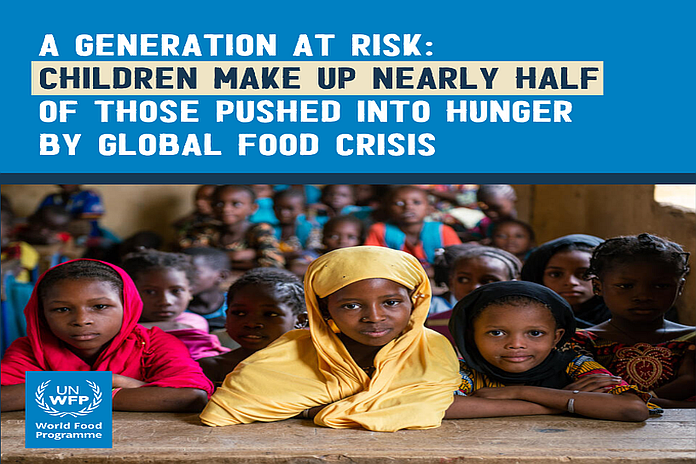ROME, Italy – School-aged children are bearing the brunt of today’s Global Food Crisis with devastating consequences for their education and their ability to catch up on learning lost during COVID school closures, warn the United Nations World Food Programme (WFP), the African Union Development Agency NEPAD, and organizations working on education, including the Education Commission chaired by Gordon Brown, former British prime minister and UN Special Envoy for Global Education.
WFP estimates that the global food crisis has pushed an additional 23 million under-18s into acute food insecurity since the start of the year, taking the total of children now affected to 153 million. This represents nearly half of the 345 million people facing acute hunger, according to WFP data from 82 countries.
The global food crisis is threatening the futures of millions of school-aged children who have only just returned to classrooms following the Covid-19 pandemic. Emerging evidence points to unprecedented learning losses during the pandemic, which risk being further compounded by this current food crisis. The World Bank estimates that the share of 10-year-olds in poorer developing countries unable to read or write has increased from 53 percent to 75 percent.
“As every parent and teacher understands, hunger is one of the biggest barriers to effective learning – and the surge in hunger among school-age children now poses a real and present danger to a learning recovery. For children who are going hungry in their classrooms, we have a ready-made, cost-effective antidote – school meal programmes. Let’s use it,” said Gordon Brown, adding: “The Transforming Education Summit is a critical opportunity to tackle the hunger crisis.”
WFP and partners are calling for an ambitious plan of action to restore school meal programmes disrupted by the pandemic and expand their reach to an additional 73 million children. Detailed costing estimates for the plan suggest around $5.8bn annually would be required.
The plan would supplement wider measures to combat child hunger, including an expansion of child and maternal health programmes, support for out-of-school children, and increased investment in safety nets. Hunger levels among the 250 million children now out of school are almost certainly higher than for those in school, the WFP warns.
“Millions of children are living with the consequences of the mutually reinforcing food and learning crises. Yet the link between hunger and lost opportunities for learning needs to be more prominent on the international agenda – and school meal programs can help break that link. Not investing in school meals programs is perhaps one of the worst possible economic decisions governments and donors can make, especially now,” says Carmen Burbano, Director of WFP’s School-based Programmes Division.
School meal programmes are among the largest and most effective social safety nets for school-aged children. They not only keep children, particularly girls, in school, but help improve learning outcomes by providing better and more nutritious diets. They also support local economies, create jobs and livelihoods in communities, and ultimately help break the links between hunger, an unsustainable food system and the learning crisis.
“The long-term effects of hunger and malnutrition are devastating for Kenya, and children in particular. Children do not have a vote, and they are not asked what their top priorities are. We have a moral duty to ensure that everyone is better protected from food price spikes and economic shocks. Failure to do so is quite literally handicapping the future of our country,” said Njiru.
A growing coalition of governments has come together to build the School Meals Coalition, which aims to ensure that every child can receive a healthy, nutritious meal, complemented by other health interventions, by 2030. Led by France and Finland, 70 countries, supported by more than 70 organizations, have worked tirelessly to scale up school meals programmes, increasing domestic investment as a response to the crisis.
For example, in Rwanda under the leadership of President Kagame, the national school meals programme has increased its coverage from 660,000 to 3.8 million children in two years, while in Benin, president Patrice Talon has committed to increase the budget for the national school meals programme from US$79 million to US$240 million over the next five years. The United States has committed to provide US$943 million for the next year to support the purchase of locally-grown foods for its national school meal effort in response to the ongoing impacts of rising food costs.
Fati N’zi-Hassane, Head of Human Capital and Institutional Development with the African Union Development Agency, which is a member of the School Meal Coalition’s taskforce, said:
“African countries have long recognized the benefits of school feeding to protect children’s health, nutrition, and education, whilst strengthening local food systems. Country ownership and commitment is the key. Efforts to protect and scale up these programmes are now more important than ever, to protect the youths of Africa from the colliding food and education crises.”





